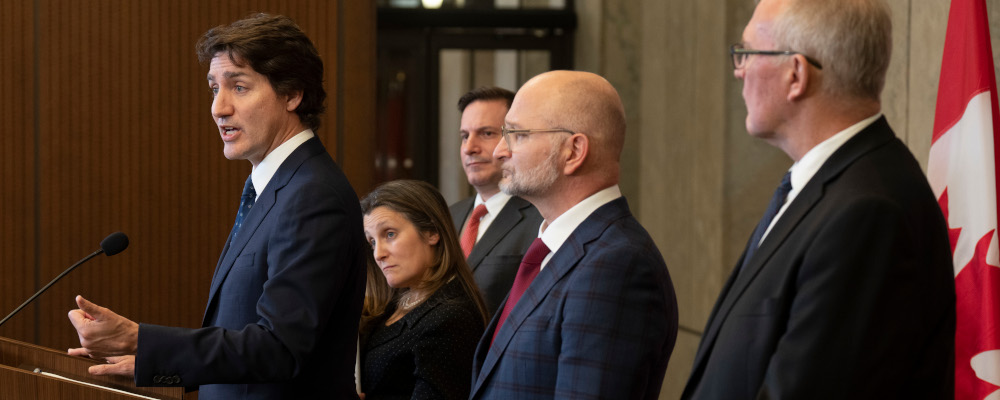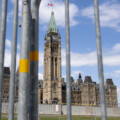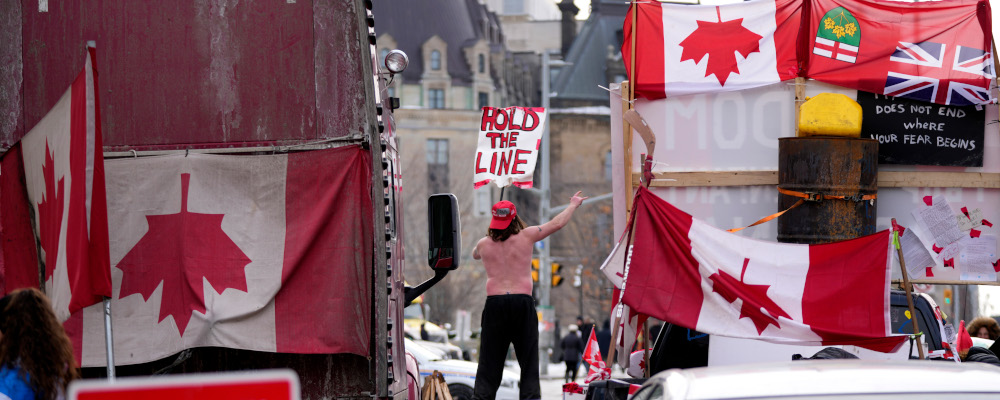Justice Mosley of the Federal Court has ruled that the Trudeau government’s invocation of the Emergencies Act was unreasonable, that there was no national emergency justifying its invocation, and that the threshold for declaring a public order emergency was not met. It’s a decision that gives teeth to the clear guardrails laid out in the Act itself and shows a remarkable degree of judicial humility and open-mindedness.
Last year, Justice Paul Rouleau released his report following the Public Order Emergency Commission hearings in Ottawa which concluded that in all of the circumstances, cabinet reasonably concluded that grounds to invoke the Act were met. It’s important to emphasize that Rouleau’s mandate as chair of the Commission was to inquire into the circumstances and facts leading up to the invocation of the Act and the “appropriateness and effectiveness of the measures.” Rouleau was not tasked with making a legal determination, nor was his decision binding in law. The Federal Court decision is a formal legal declaration and serves as binding precedent. It is the first judicial exposition of what the text of the Act means and what it does not mean.
The central question Justice Mosley sought to answer in assessing whether the threshold for invoking the Act was met was what evidence was before cabinet when they recommended that the prime minister invoke the Act, and whether that evidence could suffice to form a reasonable basis for its invocation.

The decision is important for its swift rejection of the essentially untrammeled deference to the executive that the attorney general’s office argued for in its submissions on the standard of review (essentially, how critical of an eye a reviewing judge should use when reviewing a government decision). Mosley noted the AG’s gobsmacking assertion that extraordinary deference is due to cabinet in reviewing its decision because of its status “at the apex of the Canadian executive.” The AG was essentially arguing for unconstrained executive powers to impose war measures.
Justice Mosley rejected the AG’s proposition entirely, finding that cabinet is certainly owed deference—it needs to respond to a fluid situation quickly—but only within the constraints of the law and its objective thresholds. The Act was clearly aimed at this specific type of constraint and was designed to provide guardrails to the executive as they weighed invoking the tremendous powers delegated by the Act. There cannot be absolute discretion when invoking emergency powers.
Like Justice Rouleau, Justice Mosley notes that much of the breakdown that occurred during the Freedom Convoy was attributable not to an actual inability of the Ottawa police to properly enforce the rule of law, but rather to a breakdown in leadership and communications. Here, there is a sharp contrast in judgment. While Rouleau concluded in his report that this functional breakdown in policing could amount to an actual inability of existing laws and police powers to handle the crisis, Mosley says this is a misplaced justification for the Act and cannot furnish the Act’s requirement that it be used only as a last resort: “The GIC cannot invoke the Emergencies Act because it is convenient, or because it may work better than other tools at their disposal or available to the provinces.”
In her presser immediately following the release of the decision, Deputy Prime Minister Chrystia Freeland reprised her argument at the Rouleau Commission hearings that economic harm, in particular the border blockades at Coutts and Windsor—both of which were cleared before the Act’s invocation—posed a threat to national security: “I would just remind Canadians how serious the situation was when we took that decision….our national security, which includes our national economic security, was under threat.” Justice Mosley doesn’t accept this economic rationale, because “threats to the security of Canada” in the Act are explicitly stated to mean the same thing as it means under section 2 of the CSIS Act definition, and that is based on the government’s justification: “the threat or use of acts of serious violence against persons or property.”
As a result, the judge rejected the government’s assertion that loss of trade, or economic harm, could constitute “serious violence.” The main question in assessing the reasonableness of cabinet’s decision, then, is whether “there were reasonable grounds to believe that the people protesting in Ottawa and elsewhere across Canada had engaged in activities directed toward or in support of the threat or use of acts of serious violence against persons or property.” There was nothing in the record to suggest this conclusion.
Intriguingly, the judge presented a possible legislative path for the government to take in response to his findings: amend the Emergencies Act to remove its link to the CSIS Act: “It may be that Parliament will wish to revisit the question of whether the CSIS Act definition […] adequately covers the different harms […]. This Court can only apply the law as it finds it.”
That would be a terrible mistake. The Act’s incorporation of an external security standard in place of the CSIS Act was intended by its drafters for exactly a circumstance that would eventually lead to a set of eyes to look for the threat of violence and come up short. It was designed to allow a second set of inputs, dialled into the issue of national security, but without the same political incentives as cabinet, to support cabinet’s conclusion that a national emergency existed.

In his review of the regulations and economic order imposed after the invocation of the Act—which allowed police extraordinary powers to stop peaceful protests, criminalize those protesting government policy without participating in blockades, and freeze bank accounts without a warrant, Justice Mosley found the regulations violated the right to free expression, because they captured constitutionally protected peaceful speech. He also found the economic order directing financial institutions to freeze bank accounts and disclose the financial information of any “designated person” (even without any reasonable or probable grounds to believe that person committed an offense) violated the right against unreasonable search and seizure. Neither violation was justified under section 1 of the Charter.
Finally, the decision is a happy vindication for the work of public interest litigants, such as the legal charity I am fortunate to direct, the Canadian Constitution Foundation. In his conclusion, Justice Mosley reflects with unusual candour about his priors going into the hearings. He admits that he “was leaning to the view that the decision to invoke the EA was reasonable.” But upon second-order thinking and careful deliberation “about the evidence and submissions, particularly those of [ civil liberties groups] the CCLA and CCF,” he was brought around to the sober reflection that invoking nationwide emergency powers cannot be countenanced in response to even extraordinarily disruptive and messy protest.
Justice Mosley’s decision serves as an enduring interpretation of the Emergencies Act but also underscores the vital role of the judiciary in maintaining a careful balance between executive authority and constitutional rights, especially in times of real or perceived crisis.
Recommended for You

Like the Blue Jays, Carney’s first budget falls just short

Canada has been cutting red tape for decades. So why is there even more of it?

The UCP empowered Albertans to have their say. Now it may be coming back to bite them

‘This is significant’: Hub Politics on Carney’s disappointing budget being overshadowed by a dramatic floor crossing




